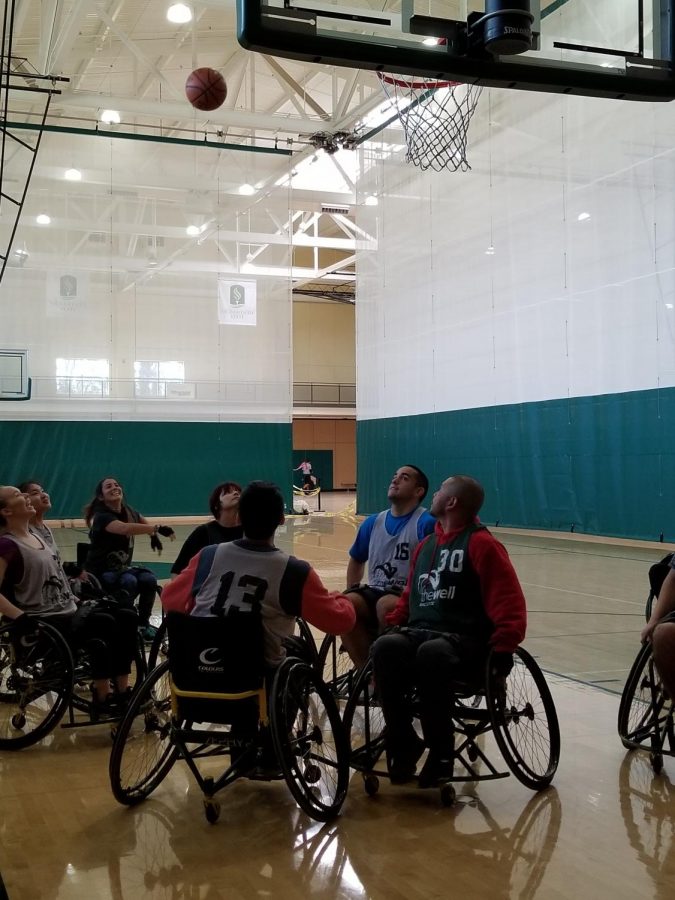AIR expands adaptive sports programming at Sac State
Student grown and operated program aims for inclusion
Mitchel Bobo – The State Hornet
One student hoisted a shot while others away the rebound during All-In-Recreation’s adaptive basketball on Feb. 15, 2019 in The WELL.
March 5, 2019
The WELL-based All In Recreation (AIR) has been offering adaptive recreational opportunities to the Sacramento State community since 2013, but are looking to continue expanding.
It began when Alivia Gok was still an undergrad student at Sac State. Gok has since come full circle, as she now serves as a certified therapeutic recreation specialist and overseer of the AIR program.
Gok said that the program was born out of necessity.
Gok brought passion as well as facts and figures when she pitched the idea to her superiors at The WELL, but she cites multiple members of the Sac State community as being integral to the program’s growth.
Gok recalled a time when their equipment consisted of two donated chairs, a stark contrast to their current state.
“One of the professors, Daniel Hoffman, wrote and applied for multiple grants that allowed for us to get a fleet of 22 all-sport wheelchairs. We have four tennis wheelchairs, eight quad rugby chairs, and we also have two track chairs,” Gok said. “Those are some of the amazing pieces of equipment we have. If you take all our sport wheelchairs for example. We’re talking anywhere from three grand and up. So, 22 of those times three grand… I’ll let you do the math. And that’s a discount because we bought a bunch at once.”
Student supervisor and RPTA major Lexie Egerer has been involved with the program for two years. Her duties include supervising programs and volunteer involvement, along with maintaining equipment.
Partnerships and collaborations with the city of Sacramento as well as Sac State have been vital in the program’s growth; not just from a monetary standpoint but also with regards to participation.
“That’s just kind of how it works with adaptive sports. You definitely have to have more than one organization willing to be involved in the progression of a program or most likely it’s not going to work, because all of this equipment is so expensive, and the community is very spread out,” Egerer said. “So, to get people to like come together and all be part of one thing takes a while. So, you definitely need a lot of organizations coming together to make it happen.”.
At one point or another AIR has teamed up with a number of groups that reside both on and off campus: the Special Olympics, Student Health and Counseling Services, Access Leisure, Associated Students, Inc., The Giving Gallery and Sac State’s RPTA program.
The relationship between The WELL and RPTA is one that is mutually beneficial.
According to Sac State student Jennifer Truong, AIR allows her to accrue the 15 volunteer hours necessary for completing the RPTA program, while she gets hands-on experience.
Simultaneously AIR benefits through savings in cost, as volunteers from Sac State’s RPTA program make up a “big chunk” of the program.
“That’s the cost I’m able to keep down and keep the students from having to pay, as well as giving them an opportunity to learn to facilitate the sports themselves and become an advocate so we can get more people out there in the world doing programs like this,” Gok said.
The current task at hand for AIR is to increase awareness and involvement in the program.
Such is the nature of their recent partnership with The Giving Gallery, a nonprofit organization geared towards raising “awareness and funds for mental health through art sales,” according to their website.
The two organizations will be collaborating along with ASI for Crayon Therapy Night on March 12, which will focus on showing attendees the therapeutic nature of art.
It’s another offering to add to AIR’s already robust catalogue, which includes adaptive kayaking, adaptive climbing, wheelchair basketball, wheelchair rugby and beep kickball. All of which are available to those with and without disabilities — free of cost.
“The only other adaptive sports that are happening in the area are leagues you have to sign up for, have your own equipment for, and show up and pay for this league and everything,” Egerer said. “This is really special.”





























































































































